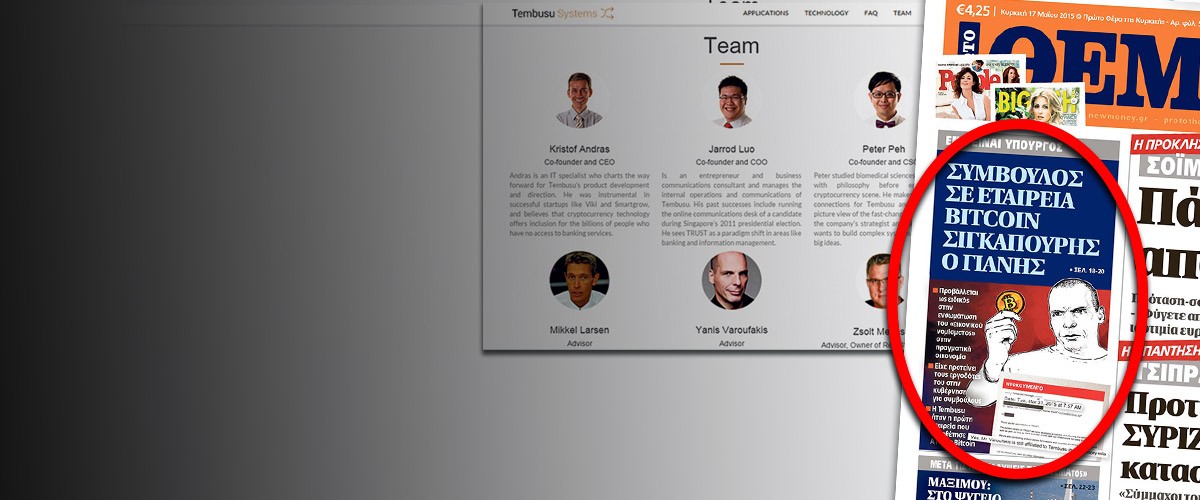Finance Minister Yanis Varoufakis is a consultant to a controversial Singaporean company that launched the digital currency Bitcoins.
Proto Thema obtained an e-mail where one of the managers of Tembusu Systems states that Varoufakis retained his post at least until March 31, 2015, almost two months after taking office as Greece’s finance minister and just a day before playing an April Fool’s Day joke on Greece, where he issued a statement to his followers on Twitter stating that “while Greece’s lenders are pushing the Greek government to accept their terms in order to allocate funds so that the country will not go bankrupt, Greek Finance Minister Yanis Varoufakis seems to have another ace up his sleeve.”
Varoufakis’ name is featured on the page of the company http://www.tembusu.sg/. His profile is among the company’s line-up as an advisor.
His role in the company raises legitimate questions about a conflict of interest in Varoufakis’ support of an extreme albeit innovative method for financial transactions. The whole philosophy of digital currency transactions point to this method as a prospective answer to the debt and liquidity crisis in Greece.

ΤHE E-MAIL TO TEMBUSU…

…AND THE RESPONSE – CONFIRMATION FROM TEMBUSU

The Greek finance minister’s experience in the creation of digital markets could open a new chapter in the management of Greek debt. Many believe that digital money is a solution and Varoufakis certainly seems to have the know-how of how the crypto-currency could be used to salvage the Greek economy.
Varoufakis’ relationship with Tembusu began in November 2014 when the company recruited the prominent university professor to its advisory board. The founders of the company say they offered him the job because they appreciated his work in the planning of a “digital economy” for Valve Corp., an online video game company.
The company was the first that dared to install Bitcoin ATMs in Singapore with the company bracing to leap a level to the “new era of digital trading platforms.”
Naturally, Varoufakis could not resist the invitation and was involved as an advisor – according to the company – for months after becoming minister despite the conflict of interest between hiw new post with employment in a private company. Market experts say that such positions are rewarded with stock options instead of fees with advisors receiving equity shares.
Who could forget the Feb. 24 article in The Guardian that was penned by Paul Mason with Varoufakis and Bitcoin digital money as the key characters. Mason referred to Varoufakis as one of the worshipers of Bitcoin and referred to “a brave attempt to create a currency away from state or central bank control, in fact far off the control of any central authority.” Shortly before his collaboration with Tembusu, Varoufakis had given a detailed description as to how digital money could be exploited to boost demand through the so-called ‘quantitative easing’.
At the time, Bitcoin was already seen as obsolete and hazardous due to the fact that hackers could target it. The digital currency stood accused of having turned into a veritable money laundering tool. Even so, the virtual currency of the new generation was already being hammered out by a group of economists and businessmen, including the future Greek finance minister.
Varoufakis had publicly stated that if Greece used digital money, rated 1 to 1 with the euro, it could solve its liquidity problem. For this to happen, however, the state would have to issue the digital currency complete with a method for converting it into ‘tangible’ material goods. Varoufakis had argued that if the government had released a digital currency parallel to the euro and forced the banks and companies to use it, then this would increase the money supply irrespective of ECB policies.

ΤΟ TWEET

The April Fool’s Day joke…



Varoufakis’ response to Proto Thema
The Ministry of Finance responded to the publication with the minister stating: “This is research I was involved in before entering politics.” Regarding Tembusu, he writes: “They contacted me in 2013 and asked for my advice, as its creators (young, talented technocrats) had read my articles in this area. As the subject interested me, from the US, where I was working, I provided them with a thorough consulting paper. In it, I outlined a comprehensive framework of electronic payment systems, which I named TRUST.”
He denies any collaboration with the company since turning in that report on December 2014. His name as advisor at Tembusu, according to Varoufakis, marks his contribution. He insists that Proto Thema retract the insinuation that he had recommended hiring Tembusu to the government.
On its part, Proto Thema points to the letters, articles and aforementioned information that shows the link between Varoufakis and the company.
Ask me anything
Explore related questions





